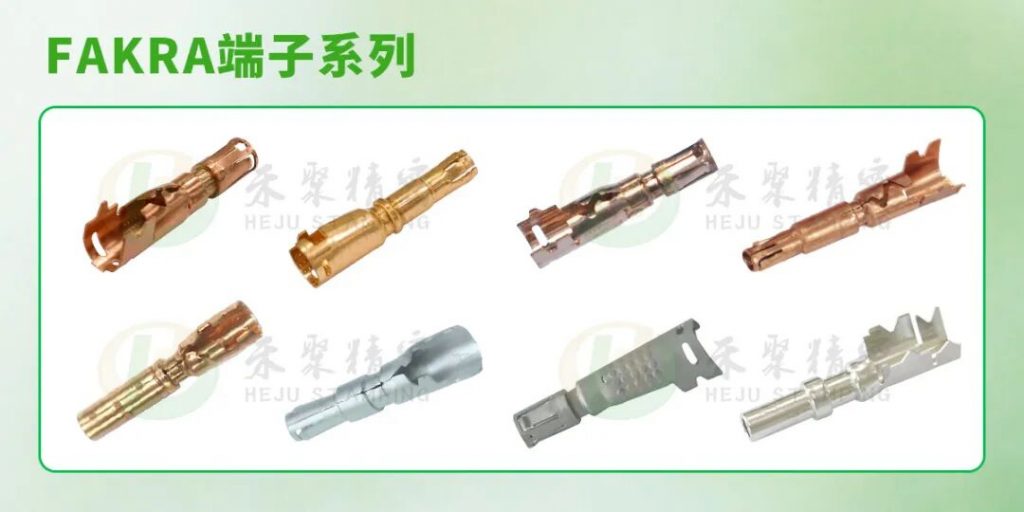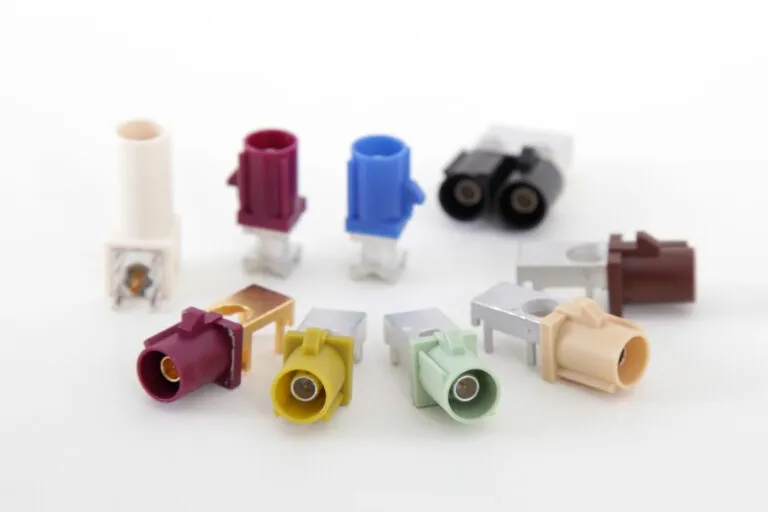Mini-FAKRA’s Connectivity Solution: Dealing with Automotive Data Flood
Mini-FAKRA connectors are a smaller version of the popular FAKRA connector. Due to their compact size and light weight, they are commonly used in automotives and new energy electric vehicles.
Mini FAKRA: High-speed Mini-FAKRA (HFM) connectors are 80% smaller than traditional FAKRA connectors. These miniature coaxial connectors are used in a variety of automotive applications, including surround-view cameras, GPS navigation, autonomous driving, driver assistance systems, high-bandwidth infotainment, and computing models. Available in straight or right-angle versions, they are rugged, lightweight, and compact. They offer data rates up to 28 Gb/s. Type A mini-FAKRA connectors support data transmission up to 20 Gb/s.
Mini-FAKRA Connectors Design
Major global automakers and system suppliers accept the FAKRA standard for automotive communications and entertainment applications. Configurations include a comprehensive range of application-specific configurations. FAKRA connectors require at least 100 mating and unmating cycles to operate at frequencies up to 6 GHz and continuously handle 335 volts RMS.
In in-vehicle entertainment systems, Mini-FAKRA terminals not only connect audio and video signal sources such as players, Bluetooth modules, and USB ports, but also play a crucial role in data transmission. They support high-speed data transmission, enabling smooth playback of high-quality media content such as HD video and lossless audio, significantly enhancing the driver’s and passenger’s entertainment experience.
Sensor Interface
In autonomous driving and advanced driver assistance systems (ADAS), various sensors, such as radar, cameras, and lidar, are essential components. Mini-Fakra terminals serve as a bridge between these sensors and the central processing unit. Their high reliability and low loss ensure accurate transmission of sensor data, providing a strong guarantee for safe vehicle operation.
Due to the life-critical nature of automotive connectors, manufacturers face significant challenges in achieving sales without a certain scale. Additionally, compliance with the IATF16949 standard for stamping, assembly, and testing poses further difficulties for smaller manufacturers. Consequently, there is an urgent need for a comprehensive interaction model. Suppliers must be equipped to swiftly respond to and implement engineering changes throughout both the development and mass production phases. Moreover, with the rapid growth of the new energy vehicle market, some companies in the FAKRA and Mini-Fakra connector sectors are struggling to meet customer demands due to limitations in their technical capabilities and delivery performance. Terminals have evolved beyond basic connectors; they now represent higher-level components that integrate devices with control systems.
Compared to foreign manufacturers, manufacturers in China offer responsive technical support, flexible customization services, and stable off-the-shelf supply, significantly shortening OEMs’ R&D and production cycles and effectively responding to rapidly changing market demands. Furthermore, with the rapid advancement of domestic technology, the mainstream domestically produced MINI Fakra connectors now rival foreign counterparts in key performance indicators, fully meeting the high-speed data transmission requirements of in-vehicle HD cameras, radar, and other applications. They offer a perfect combination of high cost-effectiveness and reliable quality, and are gradually becoming a mainstream choice in the domestic market.
Automotive Terminals in China: Insights into Manufacturers’ Differentiated Value
China’s automotive electrical connector industry’s customization advantages are continuously unlocking value through deep integration into the local ecosystem. Faced with the rapid iteration of new energy vehicle platforms, local companies have established a comprehensive response mechanism encompassing “demand perception – agile development – scenario validation.”
In the highly specialized and demanding terminal industry, supplier selection directly impacts product performance, reliability, and supply chain stability. While many suppliers can offer products that meet “standards,” Heju Precision stands out as a leading partner for popular models such as BMW, QX, Xpeng, and Geely. The core of its success lies in a series of unique, internalized capabilities and commitments. These qualities permeate every aspect of its service, production, and quality systems, creating a competitive advantage that is difficult to replicate.

Heju Precision is not only a supplier, but also a deeply collaborative “engineering partner”. Its services are proactively involved from the early stages of customer design, improving project efficiency through manufacturability design optimization and transparent risk warning. In production, it relies on vertical integration and control of micron-level stamping processes, as well as the deep integration of materials science and surface treatment to ensure high product precision and consistency. It has internalized the “zero defect” culture into its corporate genes. Through a preventive quality system and self-requirements that exceed industry standards, it provides customers with stable, reliable, high-quality products, which is a solid guarantee for achieving long-term strategic cooperation!

